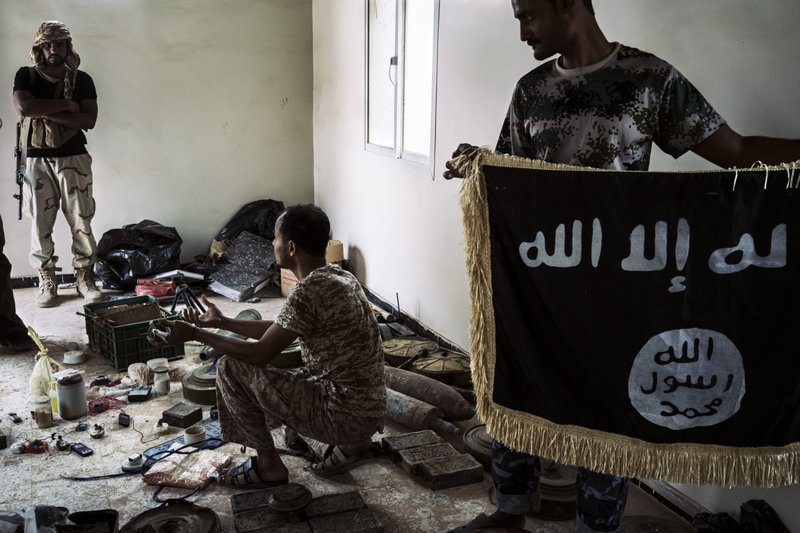CAIRO -- The Islamic State and al-Qaida are waging a deadly contest for territory, recruits and influence in Yemen that is dividing tribes and deepening instability in the Middle East's poorest nation, according to tribal leaders, security officials and analysts.
Clashes are occurring regularly in central Bayda province between Yemeni tribal forces aligned with the two extremist groups. Meanwhile, an online propaganda war of videos, images and even poems is taking place in social media forums and Internet chat rooms as both sides seek to gain more followers and sympathizers.
In recent weeks, the fighting has escalated. The Islamic State deployed suicide bombers, including a Somali citizen, against al-Qaida positions, killing or injuring more than 10 fighters, including commanders. Al-Qaida, in retaliation, attacked Islamic State bases, claiming to wrest six of them away.
Then, a tribal group affiliated with al-Qaida did something unprecedented: It offered a $20,000 reward for the apprehension or death of the local Islamic State leader.
Even after the so-called caliphate of the Islamic State in Syria and Iraq has collapsed, the group's branches continue to wage war against governments and foes from West Africa to Southeast Asia, while its ideology continues to inspire violence.
In Yemen, the rivalry is birthing a new crop of radicals and sympathizers who threaten to keep Yemen in turmoil for years, said analysts and Yemeni tribal leaders and officials.
The feud is being driven more by parochial grievances and ambitions than a desire to attack the West, analysts said, highlighting the growing localization of Islamic militant groups.
"Each one is trying to defeat the other and to show its strength on the ground, to show that they are stronger than the other," Ahmed Fadhil Abu Suraima, a deputy governor of Bayda province, said in a December interview.
Yemen's main war pits northern rebels known as Houthis against the internationally recognized Yemeni government backed by the United States and a coalition of regional powers led by Saudi Arabia and the United Arab Emirates. The four-year conflict has deepened a humanitarian crisis considered by the United Nations to be the world's most severe, has pushed the country to the brink of famine and has displaced more than 3 million people from their homes.
Al-Qaida in the Arabian Peninsula has targeted the West several times, including a failed attempt to bomb a U.S.-bound airliner over Detroit on Christmas Day in 2009 and a plot to send parcel bombs to locations in the United States.
The Islamic State emerged after political chaos followed Yemen's populist Arab Spring revolts in 2011. Today, the group numbers a few hundred fighters and has waged a guerrilla insurgency in the south, dispatching suicide bombers against Yemeni government soldiers and officials.
President Donald Trump's administration has mounted a campaign of airstrikes against both groups. This year, there have been eight Yemen airstrikes, one targeting the Islamic State and the rest against al-Qaida.
Both Sunni Muslim groups have attracted foreign fighters from Saudi Arabia, Egypt, Pakistan and other nations, tribal leaders said in interviews. Some foreigners are in leadership positions.
Until a year ago, the two groups hadn't targeted each other, preferring to focus their efforts on battling the Shiite Houthis, viewing the rebels as apostates. They even had bases close to each other, and their foot soldiers often switch allegiances between the groups.
That changed in June.
"It was basically a disagreement on properties, interests and positions," Suraima said.
Some tribal leaders and analysts say the clashes are a result of minor altercations at checkpoints, which quickly spiraled out of control. Other tribal leaders and local officials said the coalition was funding and arming tribes linked to both groups to fight the Houthis. The disputes, they say, began when the coalition began funneling more weaponry to the tribesmen with al-Qaida.
"The main reason to support them is they want to open new battlegrounds against the Houthis so they can fight them more," said an influential tribal leader in Qayfa in a December interview. Fearing for his security, he spoke on the condition of anonymity.
Elisabeth Kendall, a Yemen expert at Oxford University, suggested that the feud is "linked to local territorial and power rivalries" and may have been provoked by the coalition to sow rifts inside Yemen's militants.
According to Kendall, nearly two-thirds of al-Qaida's operations have been directed at the Islamic State, less than a quarter at UAE-backed militias fighting al-Qaida, and a mere 15 percent at the Houthis. The Islamic State is even more focused on attacking al-Qaida, according to her data.
In Web-based chat rooms, both groups put out statements claiming attacks against each other. They have bombed each other's vehicles and motorcycles, targeted each other's checkpoints and taken each other prisoner. Some battles have lasted as long as 10 hours.
With the end of the caliphate in Syria, the Islamic State in Yemen hopes to gain more territory and more popular support, analysts and tribal leaders said. But most Yemenis view the group as too brutal and overbearing.
Al-Qaida appears more focused on fighting for local supremacy than international terrorism, analysts said. But they questioned how long it will last.
"The danger right now is that because they have an active domestic insurgency wing, that wing can act as a base to rebuild and restructure their international terrorist wing," said Gregory Johnsen, a former investigator on the Yemen panel of experts for the U.N. Security Council.
A Section on 04/15/2019
